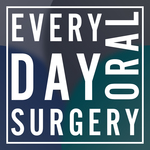Everyday Oral Surgery Podcast

Have you ever been talking with other surgeons about the way they do things in their practice and you heard something that helped you out? This podcast is meant to give you an insight into the way other surgeons do things and think about things. Sometimes small changes can make a big difference in your daily routine.
Could a more formal COO-level approach to office management be the catalyst for sustainable growth in your practice? Today on Everyday Oral Surgery, Dr. Stucki is joined again by Dr. Roger Levin, CEO of Levin Group. Dr. Levin argues that the office manager should adopt the responsibilities of a Chief Operating Officer (COO), moving beyond merely putting out fires to proactively creating systems and checklists that ensure smooth and efficient practice operations. He suggests that a great office manager grants surgeons freedom to concentrate solely on clinical excellence, patient relations, and referring doctor relationships. Ultimately leading to a significant boost in practice income and overall satisfaction. Tune in to the first episode in an upcoming series on the office manager. Today, Dr. Stucki and Dr. Levin delve into the reality of the office manager, break down the job description of the COO, outline the job responsibilities, and discuss the difficulty of managing both up and down. They talk about the responsibility of implementing systems to improve customer service, studying referral patterns, and dealing with all regulatory responsibilities. To hear more, don’t miss out on yet another impactful episode with Dr. Roger Levin.
Key Points From This Episode:
- An introduction to today’s guest and topic: a mini series on the office manager.
- Understanding the reality of office managers.
- Three things surgeons should be doing: clinical excellence, patient relations, and referring doctor relations.
- They look at the landscape of the dentistry business and why office managers may be essential.
- Dr. Levin breaks down the job description of an office manager: the COO.
- Why a solid office manager has the freedom to build a great team.
- Outlining the office manager’s job responsibilities and identifying the optimal balance.
- The hard part of the role of an office manager: managing up and down.
- Implementing and creating systems to improve customer service as an office manager.
- Studying referral patterns of referring doctors.
- Dealing with regulations and making sure all regulatory activities take place properly.
- The only caveat to today’s discussion.
Links Mentioned in Today’s Episode:
Dr. Roger Levin — https://www.linkedin.com/in/roger-levin-69ab744/
Dr. Roger Levin Email — rlevin@levingroup.com
Levin Group — https://levingroup.com/
Office Manager Practice Mastery Program —
‘Performance reviews’ — https://pubmed.ncbi.nlm.nih.gov/16060478/
Everyday Oral Surgery Website — https://www.everydayoralsurgery.com/
Everyday Oral Surgery on Instagram — https://www.instagram.com/everydayoralsurgery/
Everyday Oral Surgery on Facebook — https://www.facebook.com/EverydayOralSurgery/
Dr. Grant Stucki Email — grantstucki@gmail.com
Dr. Grant Stucki Phone — 720-441-6059

